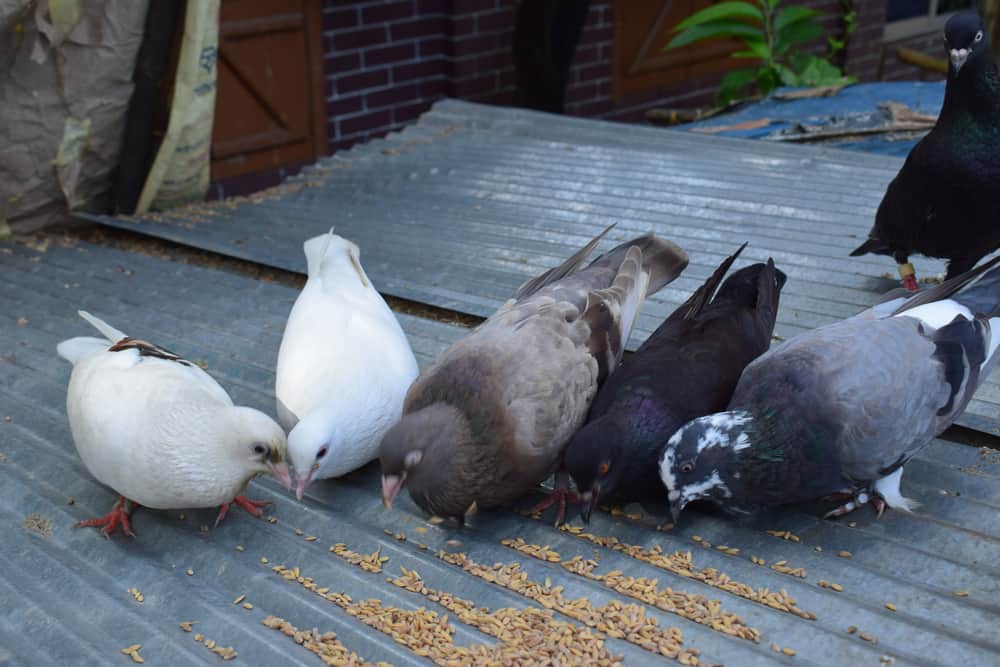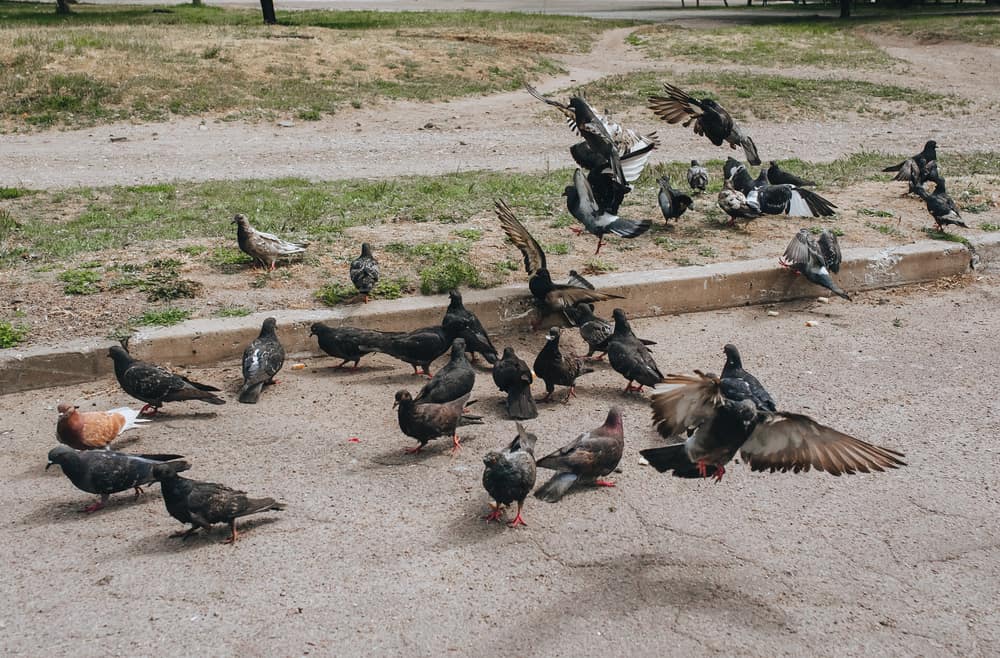Some people consider pigeons flying rats, so you need to put them under control like other pests. However, the Wildlife Act 1981 protects this species in the UK, so you can’t use usual pest control methods to get rid of these birds. The US Migratory Bird Treaty Act of 1918 doesn’t protect introduced species like feral pigeons, but you can’t use poisons to get rid of them.
The best option is to contact a pest control service to solve the problem with a pigeon infestation, but be aware that you are responsible for the used methods. One of the efficient ways to deter pigeons is to deprive them of food. So, let’s see what do pigeons eat.
What Do Pigeons Like to Eat
Pigeons are common vermin in our gardens, but many people like them flying around. If you are one of them, you can feed them during cold weather and help them survive the harsh winter. Appropriate food includes:
Protein
Protein-heavy foodstuffs are the best option for birds during the warmer months. You can offer pigeons food that will help them stay full for a longer period. They will enjoy:
- Black poppy seeds
- Oatmeal
- Dried fruit like raisins, apricots, and sultanas
Fat
Pigeons can consume almost anything you put on a bird table or in a feeder. For instance, fat-laden suet balls are highly beneficial to birds’ health and energy sources necessary for overwintering.
In most cases, pigeons will appreciate morning meals that will help them remain healthy. Never offer pigeons fat in summer since they can go rancid and harm them.
Fruits and veggies
Pigeons will adore thoroughly washed and chopped fruit, veggies, and greens, especially those with high water content. Be careful with avocado since it is potentially toxic to these birds.
Worms and insects
Pigeons enjoy consuming insects and their grubs. So, it is an excellent idea to add mealworms and waxworms to a seed mix before offering them on the bird table. This food will boost the protein content and satisfy these inherently lazy birds.
Canned pet food
Interestingly, canned pet food will provide enough proteins to pigeons. Plus, these birds adore this highly scented food. However, be careful since this smell can also attract crows, magpies, cats, and foxes.
Pellets
Nowadays, you can find commercially formulated pellets that meet all pigeons’ nutritional needs. Since they have tiny beaks, you should pick out a small-sized pellet variety.
Water
Provide fresh, clean water at any moment and thoroughly clean the bowl daily.
Harm of Pigeons
The US Department of Agriculture’s Wildlife Services considers these birds the most severe bird pests for humans and their habitats. The problem is that pigeons are not only annoying birds but can both jeopardize your health and cause expensive damage to your property, such as:
Disease
Pigeon droppings are a source of various diseases life-threatening to people, including:
- Psittacosis
- Histoplasmosis
- Cryptococcosis
Slip and fall risk
As you probably know, bird droppings are slippery. Since pigeons live in the city centers or your yard, you can face trouble with dirty and slippery porches, walkways, and decks.
Food contamination
Pigeons will contaminate human food and those intended for livestock feeding. This problem is mainly present in agricultural and rural areas where the food is at birds’ disposal.
Blockage
Blocked drainage and gutters are a real pain in the ass, and one of the primary causes is pigeons. They tend to nest downpipes and gutters and cause damage and even flooding.
Corrosion
Acidic pigeon feces can cause damage to buildings and siding but can also ruin your landscaping and planted vegetation.
Fire risk
If pigeons build their nests on the chimney tops, they will probably block them and directly cause poisonous gases buildup and increase fire risk.
15 Tips to Get Rid of Pigeons
Unfortunately, there are a few serious reasons to prevent pigeons from nesting in your garden and home. Therefore, you should apply any humane methods you have at your disposal to get rid of these menaces.
1. Remove nesting materials
It is a crucial step before using any of the methods to get rid of pigeons. Remove anything these birds can use as nesting material and clean pigeon droppings in the area.
2. Seal off the entrances
Seal all places where pigeons feel protected from predators, sun, and cold. Go to a hardware store and find one of the offered options like:
- Silicone caulk for filling small openings
- Hardware cloth for covering a bigger area
- Pigeon nets
3. Chimney cap
Pigeons enjoy nesting in the chimney, so you can solve the problem by capping it. Always check for birds trapped inside and help them leave before starting working. Buy a quality chimney cap and remember that models with smaller mesh holes are more effective, but you need to maintain it more often.
4. Reflective surfaces
Any surface that reflects light will be an excellent solution for your problem with pigeons. Bright flashes of light will negatively affect their eyes and live birds disoriented, so you can expect pigeons to avoid your garden after installation. You can use:
- Small mirrors
- Foil balloons
- Aluminum foil strips
- Outdoor reflective tape
- Old CDs
- Commercial reflective scare tape
Attach any of these items on the rope and hang them in the proper place.
5. Anti-roosting spikes
Anti-roosting spikes are an excellent option to protect ledges open to the sky from pigeon roosting. The idea is to minimize areas where they can stand. Avoid using metal spikes to prevent pigeons from injury. The better option is a durable plastic polycarbonate material that will only drive them away.
6. Pigeon repellent gel
Apply this non-toxic gel to pigeon roosting areas, particularly on balconies and roofs. Use the caulk tube to apply the gel in lines or dots over the desired location, and pigeons will avoid sticky surfaces and leave. Never smear an entire surface to prevent birds from sticking and hurting.
7. Motion-activated sprinkler
Pigeons won’t enjoy an unexpected spray of water. Therefore, this humane, non-toxic way to get rid of these annoying birds is so effective.
You can also buy a device that combines water, movement, and sound to achieve a better effect. An average sprinkler can cover approximately 1,600 sq ft (150 m2) of space 24/7 or as needed.
8. Bird shock tape
It is an efficient and relatively inexpensive method to remove birds from your property. A shock tape is a roll of 50 feet (15 m) long clear tape that conducts electricity. All you need to do is to stick it to the surface and smoothen it out.
Charge it with a solar or standard 110-volt charger and let pigeons understand that touching a particular surface causes a short electric shot. That will be enough.
9. Weatherproof string
Stretch these fine, almost invisible string pieces over pigeons’ favorite perching sites. They will cause an unpleasant loss of balance that pigeons won’t tolerate. It will be enough to check the string once or twice a month.
10. Pigeon net
Place the net on thin rods and place it at a steep angle to prevent pigeons from landing. Always leave a space of 6 inches (15 cm) between it and the nearest shrub and branch.
11. Scare-pigeon
Install a scare-pigeons that mimics raptors like hawks and falcons. Nowadays, you can find a 3D model in life-size that moves and emits raptor sounds. Be careful since pigeons can detect fraud if you fail to move your device from time to time.
12. Ultrasound repeller
Since pigeons, like other birds, can hear sounds we can’t detect, you can use their sensitive ears against them. Buy one of the ultrasound bird repellers available on the market and install it in the appropriate place in your garden.
This device will emit distress sounds and predator calls that pigeons can hear within a radius of 1 acre (0.4 hectares). Be prepared that this method rarely works immediately, so you should be patient. The goal is to force these birds to connect disturbing noises with your home, and you will solve the problem after a few days or weeks.
13. Remove the birdbath
Even though you want to attract birds with an elegant birdbath placed somewhere in your garden, you need to remove it when pigeons appear nearby. They enjoy bathing and will bully other birds trying to use this device. Possible solutions include removing the birdbath or keeping it empty.
14. Eliminate food sources
Sometimes, nothing can help you get rid of pigeons for a long, and you will face birds that keep coming back. The reason is almost always abundant food sources. When birds are hungry, they will ignore all deterrent devices. The only thing you can do in such a case is to eliminate access to food.
15. Trap and release
It is an aggressive approach, but sometimes the only option you have is to trap pigeons and release them far away from your home. Unfortunately, some species have an expressed homing instinct, so you will probably need to drive them at least 5 miles (8 km) away to solve the problem successfully.
Summary
Since pigeons are basically vermin, you should find an efficient way to get rid of them. It is crucial to discover what these birds hate, like strong smells and predatory birds, and use the desired method against them.
On the other hand, you can find a way to attract them to your garden if you admire these intelligent creatures despite the possible harm they can cause. The choice is on you.

